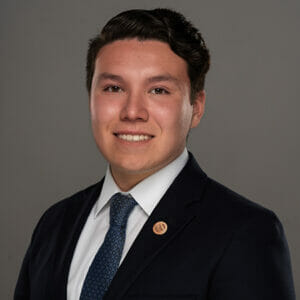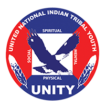
UNITY 25 Under 25 Awardee Dylan Baca shared how he “was thrilled to share my story with Points of Light on how I became inspired to use my voice and the work I’ve done with the Indigenous Peoples’ Initiative. I hope my story inspires others to take action and use their voice.” Read the full article today!
Dylan Baca is a member of the White Mountain Apache tribe in Arizona, and through his cheii, the Navajo word for grandfather, he is Navajo. He currently resides in the White Mountains, where he is a senior at Blue Ridge High School. Dylan is a strong advocate for social change and is committed to eliminating social inequities. In the spring of 2019, he started the Indigenous Peoples’ Initiative to bring accurate information about Indigenous Peoples to the greater community and, particularly, lawmakers responsible for policy decisions that impact this community.
In addition to serving as president of the Indigenous Peoples’ Initiative, in 2019, Dylan served as chairman of the Arizona Human Trafficking Prevention Committee under Arizona Governor Doug Ducey’s GOYFF office. He currently serves as a student advisor to Arizona Superintendent of Public instruction, Kathy Hoffman, and a board member of the White Mountain Democrats.
As a young person advocating for the rights of Indigenous Peoples, we were excited to learn more about what sparked his interest in advocacy and the lessons he has learned thus far.
WHO INSPIRES YOU TO USE YOUR VOICE TO SUPPORT INDIGENOUS PEOPLES?
Growing up, I lived 30 minutes from my ancestral homelands. Now, every time I drive to my home reservation, I am confronted by the stark reality of how privileged my life is compared to those in my tribal community. The lack of opportunity, infrastructure, and heightened suicide and poverty rates show me just how much assimilation and oppression have and continue to affect Indigenous communities. In reflection, I think back to my late great-grandmother, who lived to be 97. She was born in a time when Native Americans were not considered citizens. Still, during her lifetime, she was able to see Native Americans gain citizenship, gain the right to vote, and gain the ability to make decisions in the corridors of power. Her life is a reminder of how long progress can take.When I was little, I would often go to Cibecue, Arizona, on the Fort Apache Indian Reservation, where my mom’s side of the family is from. One scorching summer day, my late great-grandmother and I were walking under a tall walnut tree. Adjacent to the tree was an archaeological site; I remember it would unearth pottery, beads and tools when it would rain. When we were walking, my great-grandmother picked up a beautiful black and white pottery piece and handed it to me. When she gave it to me, she said, “Never forget where you come from.”
As a result of my great-grandmother’s influence, and seeing my community be disempowered, I started the Indigenous Peoples’ Initiative to educate and advocate for marginalized communities. One of the pieces of legislation we have been working on is to replace Columbus Day with Indigenous Peoples’ Day. I believe that by celebrating Indigenous Peoples’ Day, we acknowledge a history marked by broken promises, violence, and deprivation in hopes of creating a brighter future where we can stand side-by-side in cooperation and mutual respect for one another.
By knowing and understanding the stories of Native Americans, we honor our complete history, our national history, and therefore we understand ourselves and others better. It binds us together and reaffirms that we all are American. The celebration of Indigenous Peoples’ Day alone will not alleviate poverty on reservations; it will not eliminate domestic violence or destroy every instance of discrimination. Those things are up to us. The decisions and choices we make require us as citizens to speak out until our values are fully reflected in our laws and communities. What Indigenous Peoples’ Day does show us is an example of tangible progress that illustrates that even in the face of oppression, America can and is moving forward. It is my hope that this day will help alleviate the effects of oppression and work to create a future generation who understands the importance of Native Americans in hopes of creating a stronger and more unified nation.
A great nation does not shy away from the truth. Truth strengthens us, emboldens us, and fortifies us. It is an act of patriotism to understand our collective history. As Americans, we must recognize that the United States is a constant work in progress, and loving this country requires us as citizens to speak up for what is right. It is my hope that we can put our differences aside and work together with cooperation and mutual respect for one another to make this nation one that truly aligns with our democratic principles. It is my hope that as I look back at my life and our nation that my contributions were in alignment with my great-grandmother’s canon, never to forget where I come from, and use it as a driving force in my work to seek out change to benefit Indigenous communities across our nation.
WHAT IS THE BIGGEST CHALLENGE YOU FACED IN YOUR ADVOCACY EFFORTS, AND HOW DID YOU OVERCOME IT?
The biggest challenge we have faced while doing our advocacy work is negotiations with lawmakers. The Indigenous Peoples’ Initiative‘s primary focus is to educate and advocate for marginalized populations to ensure lawmakers and other individuals in power make informed policy decisions. Sometimes it is difficult to find common ground. Still, after a project we have been working on comes to fruition, it makes the many hours, sleepless nights, and meetings well worth it if it means it will advance Indigenous communities and move along the work of the IPI.
IF YOU COULD GO BACK IN TIME AND GIVE A PIECE OF ADVICE TO YOUR YOUNGER SELF WHEN YOU WERE STARTING YOUR WORK, WHAT WOULD YOU SAY?
If I were to go back to those days and nights where I did not know what to do or how to proceed but continued to work and tried to find solutions, I would give myself the same advice my golf coach gives me. He said, “Dylan, anytime you feel you can’t do it, take a step back and breathe… when you return to your task, you will come back with more focus, clarity, and understanding.” Advocacy work is frustrating and sometimes makes you want to give up, but the most rewarding thing for me is to see progress, and the work we have been doing is benefitting people.
WHAT ARE THE MAIN STEPS FOR SOMEONE WHO WANTS TO FIND THEIR VOICE AND USE IT TO ADVANCE A CAUSE THEY CARE ABOUT BUT DON’T KNOW HOW TO GET STARTED?
It is sometimes hard to find your voice; I found mine out of personal experiences and my Indigenous Heritage. Growing up, I lived 30 minutes from my ancestral homelands. Now, every time I drive to my home reservation, I am confronted by the stark reality of how privileged my life is compared to those in my tribal community. The lack of opportunity, infrastructure, and heightened suicide and poverty rates show me just how much assimilation and oppression have and continue to affect Indigenous communities.
In reflection, I think back to my late great-grandmother, who lived to be 97. She was born in a time when Native Americans were not considered citizens. Still, during her lifetime, she was able to see Native Americans gain citizenship, gain the right to vote, and gain the ability to make decisions in the corridors of power. As a result of my great-grandmother’s influence and seeing my community be disempowered, I started the Indigenous Peoples Initiative to educate and advocate for marginalized communities. When I began the Initiative, I had the opportunity to work as the chairman of the Arizona Human Trafficking Prevention Committee under Governor Ducey’s GOYFF office. As a committee, we were at the state legislator, and I had the opportunity to meet with Az state Senator Jamescita Peshlakai to discuss my ideas, and that’s the day we started the IPI together. Your story does not have to be like this. Find something your spark, something that makes you passionate and driven to make a change. I would start by having a conversation with your mentor. They will have good ideas or even contacts to get you started.
WHAT THREE PIECES OF ADVICE WOULD YOU GIVE TO SOMEONE WHO DOESN’T THINK THEIR VOICE MATTERS OR WILL MAKE AN IMPACT?
Believe that you can be the change your school, community, state, nation, or world needs.
Change will not come if we wait for someone or wait for some other time. We are the ones who will inspire that change. We are the person to make the change we seek.
Visualize success.
WHEN FACED WITH SPEAKING WITH PEOPLE WHO MAY DISAGREE WITH YOU, HOW DO YOU APPROACH THOSE SITUATIONS SO THEY ARE CONSTRUCTIVE AND NOT CONFRONTATIONAL?
One of the reasons I believe there is such a deep chasm in American politics right now is our inability to have conversations where we can respectfully disagree. Every time I approach a conversation with anyone, I treat them with the same kindness, decency, and respect that I would want to be treated with. When we disagree on topics, I respect their views, explain why I disagree and allow time to share their viewpoint. It’s fine to disagree on the vision and issues but find common ground in human decency’s fundamental principles of kindness and respect.
WHAT DID YOU DO TO BRING PEOPLE ALONG WITH YOU TO SUPPORT YOUR WORK?
As a leader, we have the ability to inspire. When we share our passion and our stories with others, people feel a deeper connection, and it encourages people to support and work alongside us. In my experience, when people can feel connected to an issue and understand your passion, more often than not, you will personally inspire them to support or work alongside you.
HOW DO YOU GET YOUR MESSAGE OUT TO MOVE YOUR ADVOCACY EFFORTS FORWARD? SOCIAL MEDIA, PUBLIC EVENTS, ETC.?
Right now, our most prominent modes of communication are our partners, website, and social media. Due to the pandemic, we have held only one in-person event, but we often communicate with our partners to see if there are opportunities to participate in events.
WHAT IS YOUR HOPE FOR THE FUTURE?
Our nation’s history has taught us time and time again that peace, love, and nonviolence works to protect us against the dark corners of the human spirit. When our generation’s story is told, let it be our generation who laid down the heavy burden of hate and let peace triumph over violence and hatred. Let it be our generation who worked to create a society built on the ideas of equality, peace and unity.
FOLLOW INDIGENOUS PEOPLES’ INITIATIVE ON SOCIAL MEDIA:
- Instagram: @AZIPDI
- Twitter: @IndigenousPeo14
- Facebook: Indigenous Peoples’ Initiative

DYLAN BACA: “NATIVE AMERICANS ARE AN OVERLOOKED POPULATION WITHIN THE U.S., VASTLY IGNORED FOR THE MOST PART. PERSONALLY, I’VE BEEN SHIELDED FROM THE DISCRIMINATION AND STEREOTYPES, BUT I HAVE WITNESSED DISCRIMINATION AFFECT FAMILY MEMBERS. IT HURTS. WHY DOES ONE PERSON FEEL THAT THEIR RACE IS MORE SUPERIOR TO ANOTHER? WE’RE ALL PEOPLE.”

